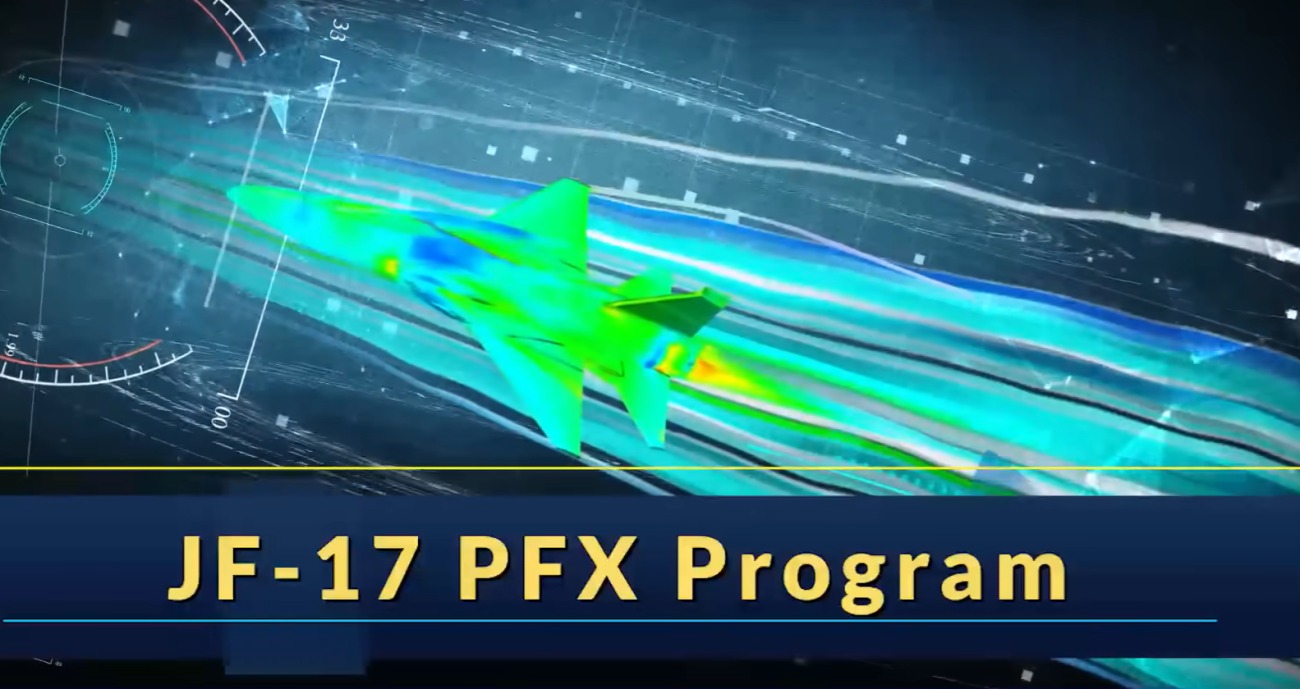The JF-17 ‘Thunder” fighter program, jointly developed by China and Pakistan, has not yielded the desired commercial success. Despite being imported by Pakistan, Nigeria, and Myanmar, it has received bad press because of the grounding of entire fleets by operating air forces.
China Scores 8 Victories Against US, Japanese Troops; US-Held Wargames Give Decisive Edge To Beijing
Now, the Pakistan Air Force (PAF) has revealed that the Block-III variant isn’t the end of the road for JF-17s as it is working on JF-17 PFX (Pakistan Fighter Experimental).
This new program was unveiled as part of a recent PAF video titled ‘Beyond Retort-From Operation Swift Retort to Operation Marg Bar Sarmachar’ commemorating five years of Operation Swift Retort, Pakistan’s retaliatory response to India’s airstrikes on Balakot in Pakistan in 2019.
According to the video, the JF-17 PFX is part of PAF’s long-term modernization strategy. However, it is still uncertain how the JF-17 PFX will be different from the JF-17 Block III. A new fighter jet in the fleet would eat into the resources; hence, logistically, it makes sense for Pakistan to continue improving JF-17 technology.
The JF-17 ‘Thunder’ combat aircraft is jointly developed by the Pakistan Aeronautical Complex (PAC) and China’s Chengdu Aircraft Industry Corp. It has a Chinese airframe and Western avionics, and is powered by a Russian engine.
Under a workshare agreement with the Aviation Industry Corporation of China (AVIC), PAC manufactures 58 percent of the JF-17’s airframe, specifically the front fuselage, vertical stabilizer, and wings. The remaining 42 percent is imported from AVIC but fully assembled at PAC. PAC is also carrying out the maintenance, repair, and overhaul (MRO) of the Thunder.
Since its induction in PAF in 2007, it has seen a slew of mishaps. There have been reports of the aircraft being grounded several times due to issues like cracks in guide vanes, exhaust nozzles, and flame stabilizers.
Myanmar, which was the first country besides Pakistan to buy JF-17, was forced to ground its fleet owing to technical malfunctions.
Reports suggest the reason behind the grounding in Myanmar was that the airframe of JF-17 reported “vibration issues.”
The Irrawaddy Times noted: “The airframe is vulnerable to damage, especially in its wingtips and hardpoints, when the aircraft encounters strong gravitational forces, according to a former pilot of the Myanmar Air Force.”
Even as the JF-17 is the mainstay of PAF, its “unreliable” engine and other technical issues make it “hazardous” for pilot safety.
An official of India’s Hindustan Aeronautics Limited (HAL) has earlier told the EurAsian Times: “The Chinese then offered their local ‘unproven’ WS-13 engine to JF-17 operators, which was refused by Pakistan for their Block-3 JF-17 fighter jets.” “Without a reliable engine, the JF-17 is very hazardous for pilot’s safety. Chances of mission success are very poor on JF-17 equipped with WS-13 engine,” the official added.
Block III Variant Of JF-17
In November 2023, PAF inducted the latest Block III version of the JF-17 fighter jet. The Block III variant comes with “superior maneuverability, extended range, and enhanced combat capabilities.”
Block III comes with improved stealth features in terms of reduction in the aircraft’s radar cross-section, a result of greater use of composites and improved avionics. The aircraft is said to be equipped with an active electronically scanned array (AESA) radar.
The radar system is the Nanjing Research Institute of Electronics Technology (NRIET) KLJ-7A X-band airborne 3D fire control radar. (FCR). Its predecessor in Block II, the KLJ-7 V2 radar, can detect an aircraft with a radar cross-section of 3 meters square at a range of 150 km. The KLJ-7A is claimed to be better at multi-targeting capability, increased resilience to jamming, and has greater range.
Recently, Azerbaijan signed a contract to purchase the Pak-Chinese fighter jet, JF-17 Block III variant. The sale of JF-17 ‘Thunder’ to Azerbaijan is the largest defense export deal in Pakistan’s history.
The deal will supply eight fighter jets in the first tranche with a clause for a follow-on order of another 8 JF-17s. Azerbaijan has become the third country after Myanmar and Nigeria to opt for the fighter jet.

PAF’s Modernization Drive
The JF-17 Thunder is one of the workhorse multirole fighter aircraft of the PAF. The PAF has acquired 50 Block-Is, 62 Block-IIs, and 26 two-seat JF-17Bs, and is on track to add 30 Block-III or JF-17Cs to its fleet.
The PAF’s JF-17s are deployed in six fighter squadrons: No.02 (block II), no. 14 (Block II), No. 16 (Block 1,2,3, B), No. 18 (JF-17B), No. 26 (Block 1,2) and No. 28 (Block 1,2). They cover PAF’s north, central, and south commands. Hence, extending the life of the JF-17 airframe continues to be a priority.
Pakistan faces the prospect of keeping the PAC production line running after its order of the Block III variant is complete. Its perilous economic situation can throw a spanner in its acquisition plans.
Modernization Drive
In February 2019, India and Pakistan clashed in a brief but high-octane aerial clash. The IAF’s attack complement consisted of Mirage 2000Hs. The PAF, in turn, retaliated by sending two JF-17s, four Mirages III, and F-16s.
Since Operation Swift Retort, PAF has acquired the J-10 CE equipped with PL-15, an active radar-guided long-range air-to-air missile (LRAAM) developed by China. The PAF has expedited the acquisition and received the aircraft within a year of signing the deal.
The J-10CE filled the gap caused by the lack of induction of the new advanced models of F-16s. In J-10CE, an AESA radar is paired with LRAAM and an actual combination of helmet-mounted display and sight (HMD/S) with a high off-boresight air-to-air missile (HOBS AAM). Before the J-10CE, only the F-16 had an HMD/S, but it lacked a HOBS AAM like the AIM-9X.
- Ritu Sharma has been a journalist for over a decade, writing on defense, foreign affairs, and nuclear technology.
- The author can be reached at ritu.sharma (at) mail.com
- Follow EurAsian Times on Google News




